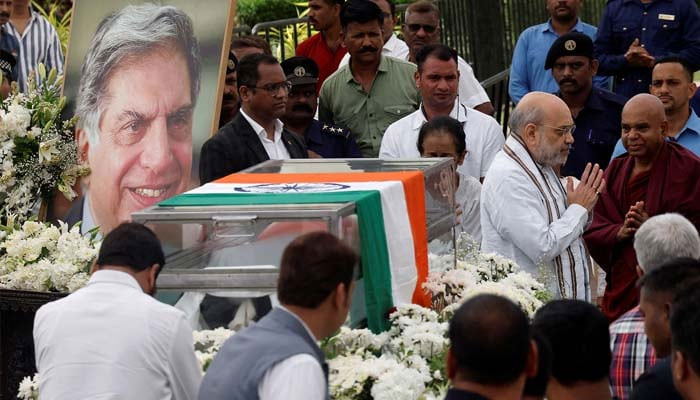Legacy of humanity
Ratan Tata opened his eyes in Zoroastrian family on December 28, 1937 during British Raj
Ratan Naval Tata, the great visionary businessman of modern history, has passed away at the age of 88. People of every religion and nationality have shed tears in his loving memory and paid tribute with fine words.
Ratan Tata, also known an RNT, opened his eyes in a Zoroastrian family on December 28, 1937 during the British Raj. His parents belonged to the Tata Group, the richest business family in India and also famous in philanthropist activities, particularly related to the fields of education and healthcare.
It is commonly believed that the founder of Tata Group, Jamshedji Nusserwanji Tata, was once restricted from entering a high-class hotel in Bombay on the basis of colonial discrimination. In response, he decided to construct a world-class modern Taj Mahal Hotel on the shores of present-day Mumbai in which all people would be allowed to enter without any bias. Today, the hotel chain has spread to nine countries outside India, including the US, the UK, and its doors are open to all citizens of the world.
When Ratan Naval Tata started leading the Tata Group in the 1990s, he introduced extensive business reforms to meet the rapidly changing demands of the new era. He merged all Tata subsidiaries and acquired global companies such as Tetley and Jaguar Land Rover. Due to such extraordinary initiatives, the Tata Group gained international recognition throughout the world.
Under the leadership of Ratan Tata, the number of companies in the Tata Group spread over six continents reached 100 with a combined sale of more than $67 billion. Undoubtedly, Ratan Tata has reached incredible heights of success by expanding business operations to all corners of the world. However, in my view, the most vital factor in his inspiring story was his humility, modesty and selfless service.
Although RNT was one of the most successful business leaders of India, he never included himself in the race of the richest people in the world. He preferred to work towards the betterment of society. Those who had the privilege of meeting Ratan Tata, say that he accorded the same respect to everyone, regardless of their social status, with a warm handshake and hospitality. Unlike other wealthy businessmen, he used to answer his own phone calls, replied to messages and carried his own luggage.
Ratan Tata was also known for his deep love for animals, especially dogs. He founded a small animal hospital in Mumbai where abandoned animals were treated. On social media, he also tried to motivate others, through his inspiring posts, to help needy animals.
In my view, Ratan Tata’s dynamic life can be summed up in the three basic teachings of Zoroastrianism: Good Thoughts, Good Words and Good Deeds. He was a strong advocate of ensuring equal rights to everyone.
I believe that one of the big secrets of Ratan’s success that remained hidden from the public eye was his ability to judge people and talent. He hired and engaged the right person at the right job, resulting in transformation of the Tata Group into a global success story. Ratan Tata was also a man of word. Being a patron of education, healthcare, medicine, and rural development, he donated generously to charities and utilized the income earned from the Tata Group to fund welfare projects.
Ratan Tata has proven with all his enduring achievements that we can succeed in business without compromising on ethics. By adhering to high moral principles, he demonstrated to people around the world that we can succeed by following the right path, if our intention is good and direction is right.
The writer is a member of the National Assembly and patron-in-chief of the Pakistan Hindu Council. He tweets/posts @RVankwani
-
 Czech Republic Supports Social Media Ban For Under-15
Czech Republic Supports Social Media Ban For Under-15 -
 Prince William Ready To End 'shielding' Of ‘disgraced’ Andrew Amid Epstein Scandal
Prince William Ready To End 'shielding' Of ‘disgraced’ Andrew Amid Epstein Scandal -
 Chris Hemsworth Hailed By Halle Berry For Sweet Gesture
Chris Hemsworth Hailed By Halle Berry For Sweet Gesture -
 Blac Chyna Reveals Her New Approach To Love, Healing After Recent Heartbreak
Blac Chyna Reveals Her New Approach To Love, Healing After Recent Heartbreak -
 Royal Family's Approach To Deal With Andrew Finally Revealed
Royal Family's Approach To Deal With Andrew Finally Revealed -
 Super Bowl Weekend Deals Blow To 'Melania' Documentary's Box Office
Super Bowl Weekend Deals Blow To 'Melania' Documentary's Box Office -
 Meghan Markle Shares Glitzy Clips From Fifteen Percent Pledge Gala
Meghan Markle Shares Glitzy Clips From Fifteen Percent Pledge Gala -
 Melissa Jon Hart Explains Rare Reason Behind Not Revisting Old Roles
Melissa Jon Hart Explains Rare Reason Behind Not Revisting Old Roles -
 Meghan Markle Eyeing On ‘Queen’ As Ultimate Goal
Meghan Markle Eyeing On ‘Queen’ As Ultimate Goal -
 Japan Elects Takaichi As First Woman Prime Minister After Sweeping Vote
Japan Elects Takaichi As First Woman Prime Minister After Sweeping Vote -
 Kate Middleton Insists She Would Never Undermine Queen Camilla
Kate Middleton Insists She Would Never Undermine Queen Camilla -
 King Charles 'terrified' Andrew's Scandal Will End His Reign
King Charles 'terrified' Andrew's Scandal Will End His Reign -
 Winter Olympics 2026: Lindsey Vonn’s Olympic Comeback Ends In Devastating Downhill Crash
Winter Olympics 2026: Lindsey Vonn’s Olympic Comeback Ends In Devastating Downhill Crash -
 Adrien Brody Opens Up About His Football Fandom Amid '2026 Super Bowl'
Adrien Brody Opens Up About His Football Fandom Amid '2026 Super Bowl' -
 Barbra Streisand's Obsession With Cloning Revealed
Barbra Streisand's Obsession With Cloning Revealed -
 What Did Olivia Colman Tell Her Husband About Her Gender?
What Did Olivia Colman Tell Her Husband About Her Gender?




